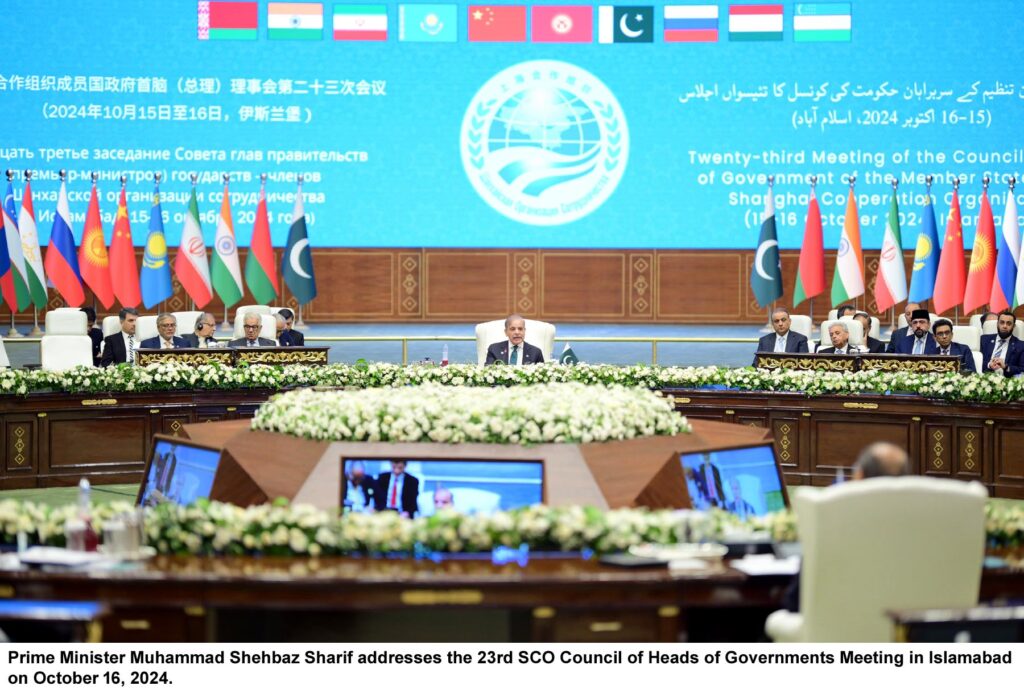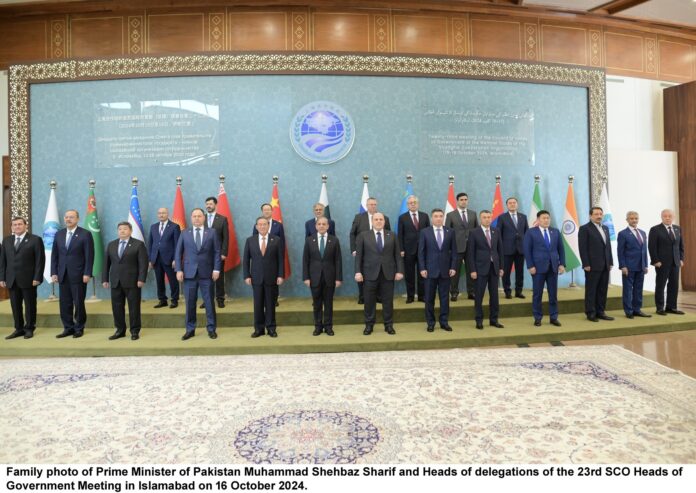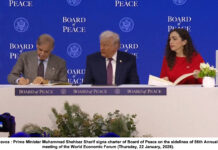The premiere also called for end of terrorism from Afghanistan
Spokesman Report
Islamabad :Prime Minister Shehbaz Sharif advocated for the expansion of China’s Belt and Road Initiative (BRI) while chairing the Shanghai Cooperation Organization (SCO) summit in Islamabad. In his address, he also called for an end of terrorism emanating from Afghanistan.“Flagship projects, like the Belt and Road Initiative (BRI), the China-Pakistan Economic Corridor (CPEC), and the International, North-South Transport Corridor (INSTC) should be expanded, focusing on developing road, rail, and digital infrastructure, that enhances integration and cooperation, across the region,” he emphasised.

He emphasized that the SCO represents the collective voice of over 40% of the global population, rooted in the Shanghai spirit.He emphasized the need to promote a shared vision of an economically integrated region and to invest in connectivity projects, urging that these should not be viewed through a political lens.The Prime Minister referred to the summit as a testament to the strength of collaboration among diverse nations. He highlighted the potential to drive socio-economic progress, enhance regional peace and stability, and improve citizens’ quality of life.PM Shehbaz urged the leaders to use the SCO meeting as an opportunity to exchange ideas, share best practices, and develop concrete action plans that would benefit their economies and societies. He expressed hope for positive outcomes from their in-depth discussions.“We are at a historic moment of transition where sweeping transformations are reshaping the global, social, political, economic and security landscape.”Highlighting the importance of a stable Afghanistan, the Prime Minister said it is not only desirable but also essential to fully realizing the great opportunities. He urged the international community to step forward with urgent humanitarian support for Afghanistan. He also called upon Afghan interim government to ensure that their soil is not misused for terrorism against its neighbors by any entity.Calling the SCO platform a “beacon of multilateralism”, he added: “I stand resolute in the belief that we possess not only the potential but the collective will to forge a future more prosperous, stable and secure for our people — a future inclusive and reflective of shared aspirations of all member states.”Highlighting climate change as an “existential crisis” that crosses borders, he referenced the devastating 2022 floods that caused around $30 billion in economic losses and severely affected lives and property. He emphasized the need to prioritize environmental cooperation within the SCO to build resilience and ensure a sustainable future for future generations.Addressing regional leaders, he pointed out that unilateral coercive measures and protectionist policies contradict international law principles. He stated that such measures hinder economic growth, stifle technological progress, and worsen inequality. He stressed the importance of reforming the global financial system and trade policies to promote equitable global development.Prime Minister Shehbaz urged participating leaders to encourage their private sectors to create a business-friendly environment for investment within the SCO region. He also praised the Pakistan Federation of Chambers of Commerce and Industry for its collaborative efforts with SCO External Ministers in Islamabad, fostering productive dialogues to strengthen economic ties. He asserted that such initiatives should be supported to enhance economic cooperation and promote regional prosperity.He commended the SCO Interbank Union and the SCO Consortium of Economic Analytic Think Tanks for their roles in addressing banking challenges and researching economic and trade dynamics, respectively.The spotlight is on Islamabad as it hosts the 23rd meeting of the Council of the Heads of Government (CHG) of the SCO. Regional leaders began arriving for this significant summit on Monday.The leaders convened at the Jinnah Convention Centre to discuss collaboration in economy, trade, environment, and socio-cultural ties and assess the organisation’s performance.Pakistan, having assumed the rotating chair for 2023-24 during the previous meeting in Bishkek, is welcoming top officials from member countries. Prime Minister Shehbaz Sharif greeted the leaders upon their arrival, followed by a group photo.Attendees of SCO summitNotable attendees include Chinese Prime Minister Li Qiang, Russian Prime Minister Mikhail Mishustin, Iranian First Vice-President Mohammad Reza Aref, and Indian External Affairs Minister Subrahmanyam Jaishankar, marking the first visit by an Indian foreign minister in nearly a decade. Jaishankar’s presence has attracted considerable attention amid ongoing tensions between India and Pakistan.The SCO comprises China, Russia, Pakistan, Kazakhstan, Kyrgyzstan, Tajikistan, Uzbekistan, Belarus, Iran, and India, with 16 additional countries participating as observers or “dialogue partners.”Mongolia is represented as an Observer State by Prime Minister Oyun-Erdene Luvsannamsrai, while Turkmenistan is attending as a Special Guest, represented by Deputy Chairman of the Cabinet of Ministers Rashid Meredov.Key figures at the summit also include SCO Secretary-General Zhang Ming and other prominent officials from various SCO bodies. The largest delegation comes from Russia, which includes over 58 journalists.Important decisions aimed at enhancing cooperation among SCO member states and approving the organisation’s budget are expected to be made during the summit.




